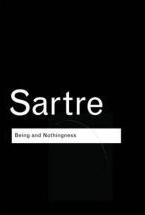 Though I’m obsessed with philosophy, we have a tortured relationship. The whole concept of discussing an idea and its implications to death is pure heaven for me. But I like to be right (i.e. not WRONG) and I usually feel inadequately prepared to properly discuss important ideas. In reading Being and Nothingness by Jean-Paul Sartre, there were ideas I wanted to share with friends, but I felt like I couldn’t without going to Wikipedia and determining first that I hadn’t misread the book.
Though I’m obsessed with philosophy, we have a tortured relationship. The whole concept of discussing an idea and its implications to death is pure heaven for me. But I like to be right (i.e. not WRONG) and I usually feel inadequately prepared to properly discuss important ideas. In reading Being and Nothingness by Jean-Paul Sartre, there were ideas I wanted to share with friends, but I felt like I couldn’t without going to Wikipedia and determining first that I hadn’t misread the book.
The Flawed Way I Read This Book
Sometimes you have to be who you are. I don’t even remember the first 200 pages of this book. I read them too long ago and the language was thick and I never got my head around it. I don’t remember the last 100 either; I was so immersed in the implications of being-for-others. I didn’t skip anything, but I rapidly skimmed entire sections.
My Relationship with the Other
I became obsessed with how I had defined myself in Others. I thought about the Others I acknowledged and the people who did not contribute to my definition of me at all. I started to think about how being-for-others affected each of my relationships and what it all means for my next book.
I took a hard look at friendships I maintained, contact I had severed, and people I had simply let go. In thinking of Others, I climbed entirely within myself. And then I wanted to reach out to friends to discuss the ways in which we had defined each other. I became filled with forgiveness for others and wished for others to forgive me. I very nearly got sidetracked and failed to finish the book at all.
Many Ways of being Right
I think back to times when I have crucified friends because they saw the world differently than I. I want to be open to the world, not in a castle of correct facts, and I am glad for this moment of learning that knowledge is broad. By being imperfect, we can be open. We can learn and risk and grow. We can find the truths beyond the facts. I have no doubt that I would fail any exam on Being and Nothingness. But I am delighted with the knowledge the book helped me create for myself. I am still slightly uncomfortable with not having gotten all I was “supposed to” from the book, but I got what I most needed.
The lesson I will take from reading this book is that I’m not in some seminar where if I misread a sentence I will be taken down by a peer. Any bit of knowledge that I pick up is important and right in that it spurs my thinking and helps me get the places that I needed to go. If I misunderstand Sartre’s interpretation of Heidegger, no lives will be lost. And I don’t have to go back to Heidegger to determine if I agree with that interpretation. Though I will never pass Philosophy 101, I am open to knowledge and a wide expanse of human truth, and I am comfortable with that. Maybe that’s the difference between a philosopher and a student of philosophy.
Opening Up to Explore Truth
In the coming days I will take Sartre’s ideas and I will examine my long-term obsession with the living for the outside world versus living for oneself. I will continue to try to understand how we can take our relationship with an Other and turn it around to define ourselves. I will begin to learn how to forgive myself for my imperfections. And though my understanding is still imperfect, I will finally allow myself to use my new book to explore the relationship between our internal and external lives.
If this review made you want to read the book, pick up a copy of Being and Nothingness from Bookshop.org. Your purchase keeps indie booksellers in business and I receive a commission.
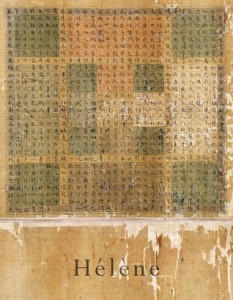
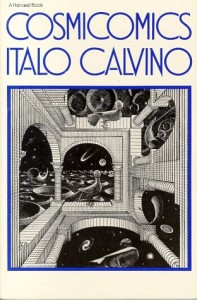 As I was reading Cosmicomics by Italo Calvino this weekend, I felt like the story “The Distance of the Moon” was somehow familiar. I had seen it—with my eyes, not in my imagination. But it wasn’t quite the same story. It took a few hours for me to remember that I was thinking of Pixar’s La Luna, the short film at the front of Brave.
As I was reading Cosmicomics by Italo Calvino this weekend, I felt like the story “The Distance of the Moon” was somehow familiar. I had seen it—with my eyes, not in my imagination. But it wasn’t quite the same story. It took a few hours for me to remember that I was thinking of Pixar’s La Luna, the short film at the front of Brave. Some writers have the power to immerse the reader in a world so forcefully that your emotions are surrendered to them and your wellbeing is completely at their mercy. That is the experience I was hoping for Love by Péter Nádas.
Some writers have the power to immerse the reader in a world so forcefully that your emotions are surrendered to them and your wellbeing is completely at their mercy. That is the experience I was hoping for Love by Péter Nádas.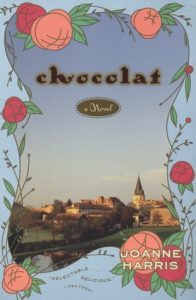 Some nights I miss Baba more than I can bear. I’m surrounded by wonderful memories of my grandmother and I know she was ready to die. Still, although it’s been nearly two years since she passed away, the grief sneaks up on me. This happened recently as I encountered the character of Armande Voizin while reading Chocolat by Joanne Harris. This review contains spoilers…
Some nights I miss Baba more than I can bear. I’m surrounded by wonderful memories of my grandmother and I know she was ready to die. Still, although it’s been nearly two years since she passed away, the grief sneaks up on me. This happened recently as I encountered the character of Armande Voizin while reading Chocolat by Joanne Harris. This review contains spoilers…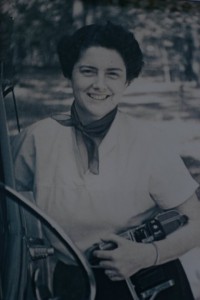 Most of us do not get to control the terms of our own exit, but I’m rewriting the story of Baba’s death. After that weekend of parties, she went home and ate a gallon of butter pecan ice cream. She snuggled up with her husband of 65 years and said goodnight one last time.
Most of us do not get to control the terms of our own exit, but I’m rewriting the story of Baba’s death. After that weekend of parties, she went home and ate a gallon of butter pecan ice cream. She snuggled up with her husband of 65 years and said goodnight one last time.